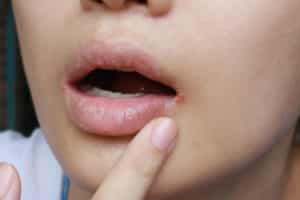Pregnancy comes with a long list of weird symptoms. From morning sickness to food cravings, the list is almost endless. Sometimes, pregnancy even comes with a symptom as unusual as dry mouth.
Although it is not one of the popular pregnancy symptoms, dry mouth is not a strange occurrence for women in this period.
In this article, you’d find all you need to know about dry mouth in pregnancy; the causes, symptoms, and treatment options.
Table of contents
What is Dry Mouth in Pregnancy?
Here’s the fact: Saliva is a really important feature in your mouth. It helps you digest food, moistens your mouth, and protects it by controlling its bacteria and fungi population.

During pregnancy, the hormone fluctuations that come with your growing baby can affect salivary secretion in your mouth. In addition, reduced salivary secretion during pregnancy may also be a sign of gestational diabetes.
Dry mouth pregnancy is a really important condition because it increases your risk of mouth infections (like thrush), tooth decay, and gum disease.
What Causes Dry Mouth During Pregnancy?
Like every other weird pregnancy symptom, many factors contribute to the development of dry mouth during pregnancy.
Some of them include:
1. Dehydration
This is what happens when your body loses more water than it gets. During pregnancy, vomiting ( during morning sickness) and diarrhea can cause dehydration. Therefore, it is advisable to drink lots of water during the entire period of your pregnancy.
In fact, we recommend an average of 8 cups daily.

In addition to causing dry mouth, dehydration during pregnancy can also lead to persistent headaches, dark yellow urine, dizziness, and extreme fatigue.
2. Side Effect of Certain Medications
Sometimes, certain prescribed medications during pregnancy can alter the amount of saliva in your mouth. For example, drugs used to treat hypertension and anti-emetics (for nausea treatment) can cause dry mouth.
In addition, dry mouth may also be a side effect of sedatives and muscle relaxants.
3. Gestational Diabetes
As we mentioned earlier, gestational diabetes is a leading cause of dry mouth during pregnancy. This condition, which raises your blood sugar level, only occurs during pregnancy. In this post, we talked about the signs, symptoms, and management of gestational diabetes.
4. Lifestyle Choices
Certain lifestyle choices can also affect the amount of saliva in your mouth during pregnancy. These include:
- Smoking
- Caffeine Intake
- Tobacco Consumption
- Irregular sleep patterns
All of the factors listed above also contribute to the development of dry mouth during pregnancy.
Symptoms of Dry Mouth during Pregnancy
In addition to the obvious dryness and absence of saliva in your mouth, other common symptoms of dry mouth pregnancy include:
- Difficulty in chewing, tasting, and swallowing
- Sore throat
- Burning sensation in the mouth
- Oral sores
- Bad breath
- Red, raw tongue
- Frequent Thirst
What to Do When Your Mouth Is Dry During Pregnancy
The first step is to identify the cause.

You can do this by speaking to your doctor to identify and eliminate the cause. If your dry mouth is a side effect of medication, he/she may adjust the dose or stop the drug entirely.
Furthermore, causes like dehydration can be sorted by drinking 8 glasses of water daily. In addition, lifestyle modifications like limiting caffeine intake, quitting smoking, and tobacco use are recommended.
You can also manage dry mouth during pregnancy by:
- Using fluoride toothpaste
- Chewing sugar-free gum
- Moisturizing the air in your living area with a humidifier
- Reducing salt intake
- Taking more liquid-based food
- Drinking more water
- Using a mouthwash
- Sucking on ice chips
- Breathing through your nose
- Avoiding alcohol
- Using a lip moisturizer
- Reducing caffeine consumption
- Rinsing your mouth before and after meals
Oral Hygiene In Pregnancy

While expecting, your oral health is more important than ever.
In addition to dry mouth, there are other important oral health conditions to consider. These include:
- Gingivitis
- Bad breath
- Thrush
- Tooth Decay
You can avoid these conditions by brushing twice daily, rinsing your mouth before and after meals, as well as using dental floss to clean the spaces between your teeth every day.
In addition to this, your diet is also super important. A healthy pregnancy diet that includes the right quantity and quality of veggies, vitamins, and milk will go a long way in improving and maintaining your oral health.
You can also take fruits like Oranges and Bananas which contain the right amount of calcium, vitamin C, and Vitamin A.
Although dry mouth during pregnancy increases the risk of the oral conditions mentioned above, you can easily avoid them by staying hydrated and following the tips listed in this article.
Conclusion
Finally, it is important to remember that dry mouth pregnancy is not strange. In fact, many other moms and moms-to-be have experienced this.
It is usually just a function of the hormone changes that come with a growing baby.
You can relieve the symptoms of dry mouth in pregnancy by drinking more water and making the necessary lifestyle modifications. If the home remedies listed in this article don’t help, please contact your doctor for more assistance.
We are always here to help you, Mama.
References
- Gupta S, Gupta N. Sjögren Syndrome and Pregnancy: A Literature Review. Perm J. 2017;21:16-047. doi: 10.7812/TPP/16-047. Epub 2016 Nov 9. PMID: 28080954; PMCID: PMC5267941.
- Fayyaz A, Kurien BT, Scofield RH. Autoantibodies in Sjögren’s Syndrome. Rheum Dis Clin North Am. 2016 Aug;42(3):419-34. doi: 10.1016/j.rdc.2016.03.002. Epub 2016 Jun 21. PMID: 27431345; PMCID: PMC4955792.

